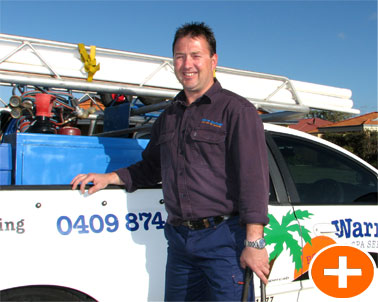An Overview Of Pool Chemicals
Warm Springs Pool and Spa Repairs
0409 874 343

Our services
Warm Springs can supply, install and repair the following:
Specialists in swimming pool and spa gas heating in addition to repairing all swimming pool and spa equipment. We also service pool and spa heaters to keep them in top condition.
Swimming Pool Equipment Repairs
Chlorinators, pool pumps, gas heaters, solar heaters, heat pumps, sand filters, cartridge filters, jets
Spa gas heaters, spa pumps, circulator pumps, blowers, filters, controllers, remotes, ozonators, jets
All Pool and Spa Brands - All Perth Suburbs - Commercial or Residential
As the owner of Warm Springs Pool and Spa Repairs I give you my personal guarantee of quality. Satisfaction guaranteed on the quality of our work. If your Perth based swimming pool or spa equipment is broken, Warm Springs will fix it.
Warren Isaac - Proprietor (Gas Fitter Licence GF12031)
What is it?! Making Sense of Pool Chemicals
Every pool owner needs to know how the chemicals in their home pools work. Whether you plan to take care of the pool yourself or hire an outside service to come in and handle your pool chemicals, it's always good to know your stuff so, at the very least, you'll understand what your pool technician is trying to tell you about your pool's pH levels and chlorine content.
While it requires much more invested time and a degree of confidence in your knowledge to handle your own pool chemicals, the money you save may make it more than worth the hassle.
Overview Of Pool Chemicals
Total pool maintenance involves a few major parts. These include chemical treatments, water balance, good maintenance (cleaning the water and vacuuming the pool floor), and proper filtration and circulation. Chemical treatments will be the main focus of this article. Chemical treatment is the first and most important part of pool maintenance, as without it, you can vacuum and heat the pool all you want, you’ll be swimming in bugs and algae without a doubt.
Types Of Chemicals
You'll need to add a few different kinds of chemicals to your pool. The first and most common is the disinfectant--most pools use chlorine for this. This will kill of unwanted or harmful organisms in the water without damaging you or your pets when you get in the water. Beware, however, as extended exposure to chlorinated water may lead to blonde/green hair and wrinkly fingers.
Pool PH
Once you've got your pool properly disinfected with chlorine or a similar substance (check out salt pools for a more health-conscious option than straight chlorine), you'll want to examine your pool's pH. This keeps your pool in a proper pH range, preventing algae buildup or the flourishing of other unwanted organisms or toxins.
Algaecide
Algaecide is aptly named, since its primary use is to deal with those pesky algae colonies that tend to crop up in your filtration system and seem to defy chlorine and pH levels to kill them.
Filter Aids
FIlter aids are an optional pool chemical, but if you find yourself suffering from filtration problems, or an exceptionally dirty pool, you may want to look into filter aids. These can help break down debris in the water and will help your filter run smoothly and keep from breaking for much longer, keeping maintenance costs down.
pH is the acidity or alkalinity of your water. It is the most important variable to control in order to ensure your pool is usable and clean. If your pH level is off, none of your other chemicals will react with your water properly, and all that algaecide and frogicide and neighbor's-uninvited-kids-repellant will be for nothing.The ideal pool should maintain a pH around 7.5, or approximately neutral. Test your pH level regularly to make sure that all your other pool maintenance is taking the desired effect. If you find your pH is off, there's a few steps you can take to fix it:
If your pH is low, or acidic, your vinyl sidings and bottoms will decay faster, and any metal plumbing will slowly corrode as well. A high pH leads to murky, gross water than can feel almost slimy and cause sliding in pool equipment. Always make sure that your pool pump is running when you add a pH adjuster. Follow the instructions carefully, as improperly applied chemicals can do just as much if not more harm to your pool than the elements ever could.
Summary
Caring for your own pool shouldn't be difficult, once you understand basically what each chemical is. The specifics of how to apply many of these chemicals is as simple as pouring them into the water in your pump, but make sure you do this properly.
Common Questions We Get:
Hi I have just moved into a house in William street that has a swimming pool, I need somebody to look at it and the equipment and let me know what’s needed. It will need cleaning and water testing though and need quotes for work and maintenance.
© 2024
